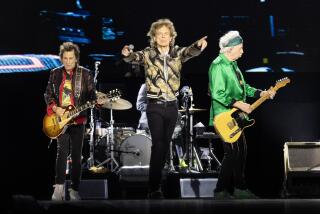He’s Spinning Gold From Yarns
- Share via
IRVINE — When his singing voice has vanished, when his songwriting muse has bid him a final adieu, Ray Davies will probably be able to carry an evening on charm alone.
But the evening when he has nothing to fall back on but his classic Kinks catalog and the skills and instincts of a superlative ham seemed far away Tuesday night at the Irvine Barclay Theatre. Davies was back with “20th Century Man,” the one-man (plus guitar accompanist) show he has been trouping about since mid-1995.
He could hardly have been in finer form. The program, a theatrical sequence combining songs, reminiscences and off-the-cuff humor tied to his 1994 autobiography, “X-Ray,” was warmed by Davies’ beguiling stage personality and comic timing. But it was carried by his singing and songwriting.
Davies, 52, has never been in better voice, at least not in the 25 years I’ve been going to Kinks shows. Maybe it was the fine acoustics of the not-quite-filled, 750-seat theater. Or maybe it has something to do with the benefits of going for a long stretch during which the still-extant but lately inactive Kinks have been on the shelf, permitting Davies to sing without having to compete with the output of a full-on rock band.
But from the gritty roar he mustered for the angry keynote song, “20th Century Man,” to a magnificent end sequence made up of some of his most tender and beautifully elegiac material, Davies was in prime vocal form. For the sake of Kinks-admiring posterity, it’s to be hoped that somebody at the soundboard had a tape running while Davies ended his winding tale with the most sublime reading of his most sublime song, “Waterloo Sunset.”
The story, structure and most of the songs in the 2-hour, 40-minute theatrical were unchanged from when Davies first performed it on the West Coast, in October 1995 at the Galaxy Concert Theatre in Santa Ana.
It’s the story of the early days of the Kinks, from boyhood scenes through the band’s hit breakthrough in 1964 with “You Really Got Me,” through the up-and-down events that left it, in 1971, somewhat bruised but ready for the long second chapter of its ongoing career.
Davies has made a few adjustments, or at least left room in the show for some variations. This time there was a bit more about the hard-drinking dad who seems to have been the awkward model for his own inspired hamminess. Davies relied less on the black-bound text of “X-Ray,” delivering many anecdotes from it in off-the-cuff narration that allowed for many a sly, grinning aside and repartee playing off the reactions of an adoring audience of Baby-Boomer Kinks fans.
Davies did not solve his piece’s two obvious weak patches, both of them long bits of uninspired, semi-sung narrative that would have been better handled with some combination of spoken bits and actual Kinks songs.
The first covered Davies’ boyhood dealings with a ridiculed hunchback in the north London suburb where he grew up. The interaction apparently was important to the development of Davies’ artistic sensitivity and his outsider’s independent vision, but Davies let his retelling drag on far too long.
The second, about fear-and-loathing on the rock ‘n’ roll campaign trail as the Kinks toured America in the mid-’60s, marked the only time that Davies did not strike an engaging and persuasive note while inhabiting characters involved in the Kinks’ story.
For the most part, his accents and impersonations--from a cheekily Liverpudlian John Lennon to the upper-crust Englishmen who managed the Kinks to a lucre-loving, Bronx-accented concert promoter--were testimony to comic stage ability not far below his musical gifts.
The show was pushed along by tight, closely attuned guitar interplay between Davies’ accomplished, idiosyncratic rhythm strumming and Peter Mathson’s nimble, expressive leads. A handful of songs written just for the stage show included a couple of keepers (which is more than you can say for the Kinks’ last two studio albums, “U.K. Jive” and “Phobia”).
“To the Bone” was a good, chunky rock song relating the devastation dealt by Davies’ first divorce, and “London” proved to be more of an evocative mood piece and less the mere travelers’ guide it seemed on first hearing in ’95.
By stringing together “Village Green,” “Days” and “Waterloo Sunset” at the end, Davies reserved the climax for the unsurpassed tenderness and lyricism that are his most distinctive claims to greatness (which isn’t to slight the fun-loving yet urgent rocker’s rave-up stance captured in “You Really Got Me”).
Taken as a whole, “20th Century Man” clinches Davies’ claim to a completely distinctive place in rock history. It’s hard to imagine any other rock performer pulling off a similar one-man show demanding comic, dramatic and literary gifts along with musical ones. For this sort of rewarding, all-around evening in a rock ‘n’ roll context, the “20th Century Man” is probably the only man.
More to Read
The biggest entertainment stories
Get our big stories about Hollywood, film, television, music, arts, culture and more right in your inbox as soon as they publish.
You may occasionally receive promotional content from the Los Angeles Times.











